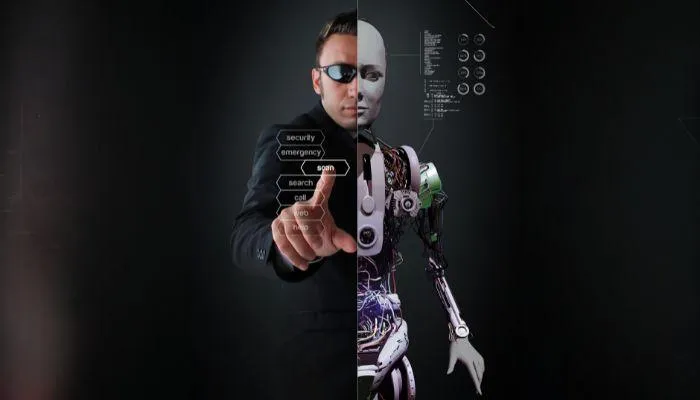Your AI Business Guy, Steven Edwards
Transforming Businesses, One Solution at a Time
AI is not just about automation and data crunching; it's about empowering businesses to make informed decisions.
Your AI Business Guy, Steven Edwards
Transforming Businesses, One Solution at a Time
AI is not just about automation and data crunching; it's about empowering businesses to make informed decisions
AI FOR BUSINESS RESOURCE CENTER

Level Up Your Product Game: How Generative AI is Revolutionizing Product Management (and What Remains Uniquely Human)
The role of a product manager has never been more complex or more exciting. As markets evolve and customer expectations rise, generative AI has emerged as a game-changer, offering new ways to streamline workflows, enhance decision-making, and unlock innovation. But while AI can take on a growing number of tasks, it doesn’t replace the human ingenuity that drives truly exceptional products.
So, how exactly is generative AI transforming product management, and what elements remain uniquely human? Let’s explore.
The AI Advantage in Product Management
Generative AI is not just about automation—it’s about amplifying human potential. Product managers juggle an immense range of responsibilities, from market research and product strategy to stakeholder communication and execution. AI is helping by:
1. Idea Generation & Market Research
AI can rapidly analyze vast amounts of customer data, social media trends, and competitor activity to identify unmet needs and emerging opportunities. Instead of spending weeks combing through market research reports, PMs can use AI to surface real-time insights in seconds.
Example: AI-powered tools like ChatGPT, Claude, and Jasper AI can synthesize customer reviews, survey responses, and industry reports to generate product concept suggestions based on pain points and preferences.
2. Enhanced Data Analysis & Forecasting
Product decisions are only as good as the data behind them. AI-driven analytics can detect patterns and predict outcomes with more accuracy than manual analysis.
AI-powered forecasting tools help PMs anticipate market demand, customer churn, and feature adoption rates before launching a product.
AI-driven A/B testing tools can analyze thousands of variations of a product experience, identifying the best-performing version instantly.
3. Automated Content & UX Writing
Generative AI is also proving valuable in content creation, from product descriptions to customer communications.
AI can generate UX microcopy, help documentation, and onboarding scripts—allowing product teams to ship faster.
AI-powered design tools, like Uizard and Figma’s AI plugins, can create UI prototypes based on natural language descriptions.
For example, Amarra, a formal gown distributor, integrated AI to write product descriptions and manage inventory, reducing content creation time by 60% and cutting overstock by 40%.
4. Smarter Prioritization & Decision-Making
Product managers must prioritize feature requests, bug fixes, and roadmap initiatives based on multiple factors—business impact, customer demand, and development effort. AI automates this decision-making by analyzing historical data and ranking priorities based on ROI.
Tools like Akkio and DataRobot help PMs create predictive models to determine which features will drive the most engagement and revenue.
What AI Can’t Replace: The Human Element in Product Management
While AI is revolutionizing many aspects of product management, there are core responsibilities that remain uniquely human.
1. Customer Empathy & Emotional Intelligence
AI can analyze sentiment, but it lacks true emotional understanding. Customers don’t just buy products based on logic—they buy based on emotion, trust, and connection.
Great PMs listen to customers beyond the data—understanding pain points in ways AI cannot.
2. Creative Vision & Innovation
AI can suggest ideas, but true innovation comes from human creativity. PMs dream up bold, disruptive ideas that challenge industry norms.
Steve Jobs famously said, “Some people say, ‘Give the customers what they want.’ But that’s not my approach. Our job is to figure out what they’re going to want before they do.”
AI is great at refining ideas, but humans are the ones who imagine the future.
3. Ethical Judgment & Strategic Thinking
Product management involves navigating ethical dilemmas, such as data privacy, bias in AI models, and the societal impact of technology.
AI cannot make ethical decisions—it follows patterns and probabilities, not moral reasoning.
Example: PMs at Google and Microsoft have faced scrutiny over AI-generated misinformation—demonstrating that human oversight is essential.
Marty Cagan of Silicon Valley Product Group emphasizes that while AI enhances product management, it doesn’t replace the essential human touch.
The Future of AI in Product Management: Finding the Right Balance
So, what does the future hold for AI-powered product managers?
AI will eliminate repetitive tasks, allowing PMs to focus on strategy, vision, and customer engagement.
AI will enhance, not replace, product teams, enabling faster experimentation and data-driven decision-making.
The best PMs will leverage AI as a partner—using it not just for automation, but as a co-pilot in creativity and problem-solving.
The key is balance—using AI for what it does best while leaning into uniquely human strengths like empathy, creativity, and leadership.
Generative AI is reshaping the role of product managers, offering tools that automate workflows, generate insights, and enhance decision-making. However, the soul of great product management remains deeply human—rooted in understanding customers, crafting visionary ideas, and navigating complex ethical decisions.
AI is here to support, not replace, human ingenuity. The best product managers will be those who embrace AI’s power while doubling down on their irreplaceable human skills.
👉 Book a Coaching Appointment
Let’s explore how AI can transform the way you work. Whether you're new to AI or ready to scale, Steven is here to guide you.
👉 Learn More About AI with this Course
Dive into The AiMBA MasterClass and Certification to master AI tools and techniques and step into the future with confidence.

Level Up Your Product Game: How Generative AI is Revolutionizing Product Management (and What Remains Uniquely Human)
The role of a product manager has never been more complex or more exciting. As markets evolve and customer expectations rise, generative AI has emerged as a game-changer, offering new ways to streamline workflows, enhance decision-making, and unlock innovation. But while AI can take on a growing number of tasks, it doesn’t replace the human ingenuity that drives truly exceptional products.
So, how exactly is generative AI transforming product management, and what elements remain uniquely human? Let’s explore.
The AI Advantage in Product Management
Generative AI is not just about automation—it’s about amplifying human potential. Product managers juggle an immense range of responsibilities, from market research and product strategy to stakeholder communication and execution. AI is helping by:
1. Idea Generation & Market Research
AI can rapidly analyze vast amounts of customer data, social media trends, and competitor activity to identify unmet needs and emerging opportunities. Instead of spending weeks combing through market research reports, PMs can use AI to surface real-time insights in seconds.
Example: AI-powered tools like ChatGPT, Claude, and Jasper AI can synthesize customer reviews, survey responses, and industry reports to generate product concept suggestions based on pain points and preferences.
2. Enhanced Data Analysis & Forecasting
Product decisions are only as good as the data behind them. AI-driven analytics can detect patterns and predict outcomes with more accuracy than manual analysis.
AI-powered forecasting tools help PMs anticipate market demand, customer churn, and feature adoption rates before launching a product.
AI-driven A/B testing tools can analyze thousands of variations of a product experience, identifying the best-performing version instantly.
3. Automated Content & UX Writing
Generative AI is also proving valuable in content creation, from product descriptions to customer communications.
AI can generate UX microcopy, help documentation, and onboarding scripts—allowing product teams to ship faster.
AI-powered design tools, like Uizard and Figma’s AI plugins, can create UI prototypes based on natural language descriptions.
For example, Amarra, a formal gown distributor, integrated AI to write product descriptions and manage inventory, reducing content creation time by 60% and cutting overstock by 40%.
4. Smarter Prioritization & Decision-Making
Product managers must prioritize feature requests, bug fixes, and roadmap initiatives based on multiple factors—business impact, customer demand, and development effort. AI automates this decision-making by analyzing historical data and ranking priorities based on ROI.
Tools like Akkio and DataRobot help PMs create predictive models to determine which features will drive the most engagement and revenue.
What AI Can’t Replace: The Human Element in Product Management
While AI is revolutionizing many aspects of product management, there are core responsibilities that remain uniquely human.
1. Customer Empathy & Emotional Intelligence
AI can analyze sentiment, but it lacks true emotional understanding. Customers don’t just buy products based on logic—they buy based on emotion, trust, and connection.
Great PMs listen to customers beyond the data—understanding pain points in ways AI cannot.
2. Creative Vision & Innovation
AI can suggest ideas, but true innovation comes from human creativity. PMs dream up bold, disruptive ideas that challenge industry norms.
Steve Jobs famously said, “Some people say, ‘Give the customers what they want.’ But that’s not my approach. Our job is to figure out what they’re going to want before they do.”
AI is great at refining ideas, but humans are the ones who imagine the future.
3. Ethical Judgment & Strategic Thinking
Product management involves navigating ethical dilemmas, such as data privacy, bias in AI models, and the societal impact of technology.
AI cannot make ethical decisions—it follows patterns and probabilities, not moral reasoning.
Example: PMs at Google and Microsoft have faced scrutiny over AI-generated misinformation—demonstrating that human oversight is essential.
Marty Cagan of Silicon Valley Product Group emphasizes that while AI enhances product management, it doesn’t replace the essential human touch.
The Future of AI in Product Management: Finding the Right Balance
So, what does the future hold for AI-powered product managers?
AI will eliminate repetitive tasks, allowing PMs to focus on strategy, vision, and customer engagement.
AI will enhance, not replace, product teams, enabling faster experimentation and data-driven decision-making.
The best PMs will leverage AI as a partner—using it not just for automation, but as a co-pilot in creativity and problem-solving.
The key is balance—using AI for what it does best while leaning into uniquely human strengths like empathy, creativity, and leadership.
Generative AI is reshaping the role of product managers, offering tools that automate workflows, generate insights, and enhance decision-making. However, the soul of great product management remains deeply human—rooted in understanding customers, crafting visionary ideas, and navigating complex ethical decisions.
AI is here to support, not replace, human ingenuity. The best product managers will be those who embrace AI’s power while doubling down on their irreplaceable human skills.
👉 Book a Coaching Appointment
Let’s explore how AI can transform the way you work. Whether you're new to AI or ready to scale, Steven is here to guide you.
👉 Learn More About AI with this Course
Dive into The AiMBA MasterClass and Certification to master AI tools and techniques and step into the future with confidence.
